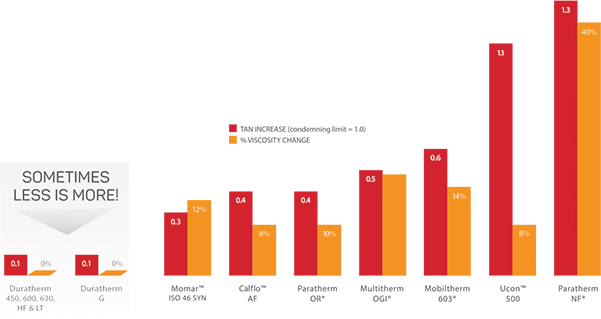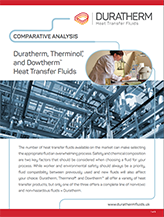 EN
EN
 ES
ES
 EN
EN
Oxidation is the leading cause of thermal fluid failure and no other line of fluids resist oxidation better than Duratherm. See the difference for yourself in our comprehensive, competitor oxidation report.

Our eco-safe products help reduce your liability from accidental spills and improve worker health and safety. When compared to what is in some of our competitor’s fluids, Duratherm thermal fluids lead the way in minimizing their impact on the environment. Read the report to find out more.

A detailed report outlining the two leading causes of premature thermal fluid degradation and some practical steps you can take to avoid them.
Routine thermal fluid analysis in conjunction with proper system maintenance are your best option when it comes to keeping everything running smoothly.
Every application has its own specific requirements when it comes to choosing the right thermal fluid for the job. These are the four most important factors you need to consider.
Compare thermal properties and other fluid characteristics using our side by side comparison tool. You can easily compare similar Duratherm thermal fluids to one another or put Duratherm up against a variety of common competitor’s fluids.
With our Heat Transfer Coefficient calculator being our most popular, this collection of six, easy to use tools will assist you in calculating a variety of industry standard data points including rates of heat transfer, thermal expansion, operating viscosity, system pressure drop and achieving turbulent flow.
Heat transfer takes place through conduction, convection and radiation. This easy-to-use series of calculators will quickly let you calculate basic heat transfer rates as well as rates for both conduction and convection. Calculate free convection by entering surface area, heat transfer coefficient and surface and fluid temperatures. For conductive heat transfer calculations, simply input your thermal conductivity data as well as surface area, temperature differentials, and thickness of materials. Basic heat transfer can also be calculated using specific heat, mass and temperature differentials.
When heat is introduced to a thermal fluid the molecules that make up the fluid exhibit an increase in their kinetic energy, the spaces between the molecules increase and the overall volume of the fluid increases. It is critical when designing any system using heat transfer fluids to account for this increase through proper sizing of expansion tanks and reservoirs. Our thermal expansion calculator requires only density data and temperature differentials (expressed in either degrees Celsius or Kelvin) to calculate coefficient of thermal expansion. Input your initial fluid volume to calculate change in volume and final volume.
Knowing the viscosity of any fluid you are trying to pump is key. As viscosity tends to change with temperature for most fluids, being able to accurately calculate viscosity across a range of operating temperatures is vital in determining if a pump can even handle a viscous fluid at lower start-up temperatures. Measured in centistokes (cSt) in honor of George Stokes, water at 20°C is used as a reference and has a base value of 1 cSt. To calculate your operating viscosity using our calculator, you’ll need viscosity vs. temperature properties for your fluid along with your operational temperatures.
Maintaining the proper flow in a heat transfer system is very important to ensuring that the correct amount of heating or cooling gets to where you need it. This series of calculators can output a range of fluid data including average flow velocity, volumetric flow rate and pipe inside diameter. You can select to use either our metric or standard versions depending on your needs. Data is accurate to within two decimal places.
An important factor in the design of any heat transfer system is knowing the overall volume of fluid that the system holds. Use this tool to calculate volumes for cylinders, spheres and rectangular storage vessels of all sizes using either metric or standard dimensions. Simply combine the data from our cylindrical and spherical volume calculators to determine volumes for expansion tanks with rounded ends to ensure accurate system capacity.
Duratherm has a global network of representatives available to serve you. Please make use of our contact form and we'll be sure to connect you with your local agent right away. [email protected]